第三章词汇翻译
- 格式:ppt
- 大小:873.00 KB
- 文档页数:86
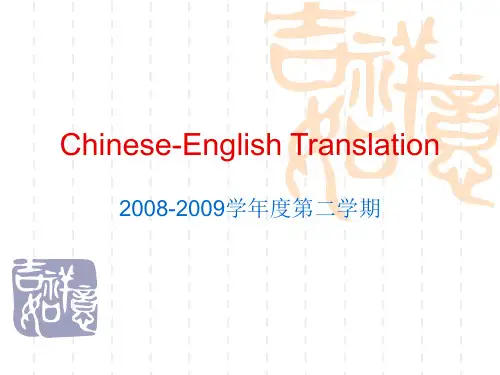
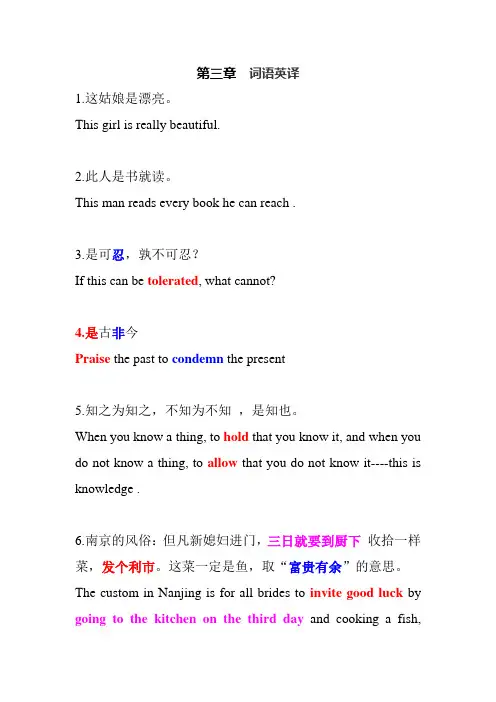
第三章词语英译1.这姑娘是漂亮。
This girl is really beautiful.2.此人是书就读。
This man reads every book he can reach .3.是可忍,孰不可忍?If this can be tolerated, what cannot?4.是古非今Praise the past to condemn the present5.知之为知之,不知为不知,是知也。
When you know a thing, to hold that you know it, and when you do not know a thing, to allow that you do not know it----this is knowledge .6.南京的风俗:但凡新媳妇进门,三日就要到厨下收拾一样菜,发个利市。
这菜一定是鱼,取“富贵有余”的意思。
The custom in Nanjing is for all brides to invite good luck by going to the kitchen on the third day and cooking a fish,which stands for fortune.7.去设埋伏我们都没有信心,想他一定在昨天晚上就早溜了,今天去也是瞎子点灯白费蜡。
We had no confidence in today's ambush because we were sure he had escaped last night. It seemed as useless as a blind man lighting a candle.8.……只因生得妩媚风流,满学中都送了两个外号:一个叫“香怜”,一个叫“玉爱”。
... Because of their glamorous looks and affected manners, were universally known by the nickname of Darling and Precious.9.克明:觉新哪,你听着!Keming: Juexin, I want you to pay particular attention to this.10.客人一走进大门,扑鼻的是一阵幽香,入目的是绿蜡似的叶子和红霞或白雪似的花朵……As guests entered the gate, they would first smell a sweet fragrance and then see the waxy green leaves and the rainbow red or snow-white flowers.11.……三十六家花酒店,七十二座管弦楼。
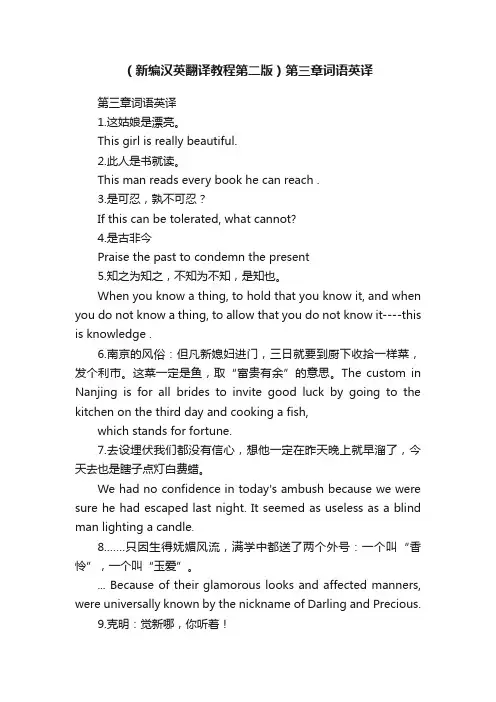
(新编汉英翻译教程第二版)第三章词语英译第三章词语英译1.这姑娘是漂亮。
This girl is really beautiful.2.此人是书就读。
This man reads every book he can reach .3.是可忍,孰不可忍?If this can be tolerated, what cannot?4.是古非今Praise the past to condemn the present5.知之为知之,不知为不知,是知也。
When you know a thing, to hold that you know it, and when you do not know a thing, to allow that you do not know it----this is knowledge .6.南京的风俗:但凡新媳妇进门,三日就要到厨下收拾一样菜,发个利市。
这菜一定是鱼,取“富贵有余”的意思。
The custom in Nanjing is for all brides to invite good luck by going to the kitchen on the third day and cooking a fish,which stands for fortune.7.去设埋伏我们都没有信心,想他一定在昨天晚上就早溜了,今天去也是瞎子点灯白费蜡。
We had no confidence in today's ambush because we were sure he had escaped last night. It seemed as useless as a blind man lighting a candle.8.……只因生得妩媚风流,满学中都送了两个外号:一个叫“香怜”,一个叫“玉爱”。
... Because of their glamorous looks and affected manners, were universally known by the nickname of Darling and Precious.9.克明:觉新哪,你听着!Keming: Juexin, I want you to pay particular attention to this.10.客人一走进大门,扑鼻的是一阵幽香,入目的是绿蜡似的叶子和红霞或白雪似的花朵……As guests entered the gate, they would first smell a sweet fragrance and then see the waxy green leaves and the rainbow red or snow-white flowers.11.……三十六家花酒店,七十二座管弦楼。
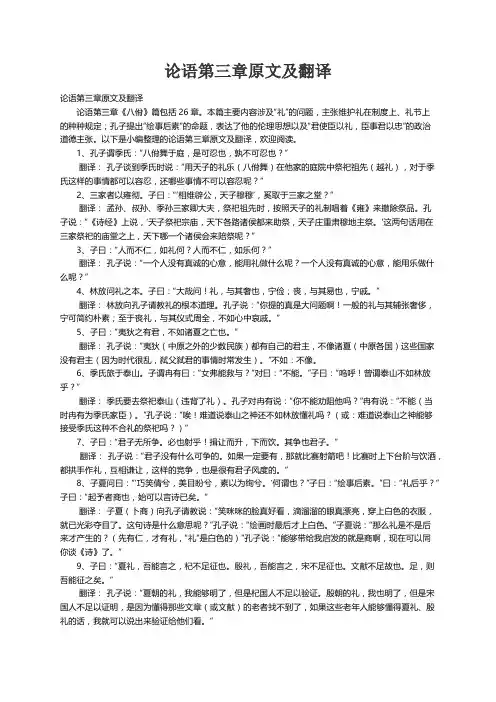
论语第三章原文及翻译论语第三章原文及翻译论语第三章《八佾》篇包括26章。
本篇主要内容涉及“礼”的问题,主张维护礼在制度上、礼节上的种种规定;孔子提出“绘事后素”的命题,表达了他的伦理思想以及“君使臣以礼,臣事君以忠”的政治道德主张。
以下是小编整理的论语第三章原文及翻译,欢迎阅读。
1、孔子谓季氏:“八佾舞于庭,是可忍也,孰不可忍也?”翻译:孔子谈到季氏时说:“用天子的礼乐(八佾舞)在他家的庭院中祭祀祖先(越礼),对于季氏这样的事情都可以容忍,还哪些事情不可以容忍呢?”2、三家者以雍彻。
子曰:“‘相维辟公,天子穆穆’,奚取于三家之堂?”翻译:孟孙、叔孙、季孙三家卿大夫,祭祀祖先时,按照天子的礼制唱着《雍》来撤除祭品。
孔子说:“《诗经》上说,‘天子祭祀宗庙,天下各路诸侯都来助祭,天子庄重肃穆地主祭。
’这两句话用在三家祭祀的庙堂之上,天下哪一个诸侯会来陪祭呢?”3、子曰:“人而不仁,如礼何?人而不仁,如乐何?”翻译:孔子说:“一个人没有真诚的心意,能用礼做什么呢?一个人没有真诚的心意,能用乐做什么呢?”4、林放问礼之本。
子曰:“大哉问!礼,与其奢也,宁俭;丧,与其易也,宁戚。
”翻译:林放向孔子请教礼的根本道理。
孔子说:“你提的真是大问题啊!一般的礼与其辅张奢侈,宁可简约朴素;至于丧礼,与其仪式周全,不如心中哀戚。
”5、子曰:“夷狄之有君,不如诸夏之亡也。
”翻译:孔子说:“夷狄(中原之外的少数民族)都有自己的君主,不像诸夏(中原各国)这些国家没有君主(因为时代很乱,弑父弑君的事情时常发生)。
”不如:不像。
6、季氏旅于泰山。
子谓冉有曰:“女弗能救与?”对曰:“不能。
”子曰:“呜呼!曾谓泰山不如林放乎?”翻译:季氏要去祭祀泰山(违背了礼)。
孔子对冉有说:“你不能劝阻他吗?”冉有说:“不能(当时冉有为季氏家臣)。
”孔子说:“唉!难道说泰山之神还不如林放懂礼吗?(或:难道说泰山之神能够接受季氏这种不合礼的祭祀吗?)”7、子曰:“君子无所争。
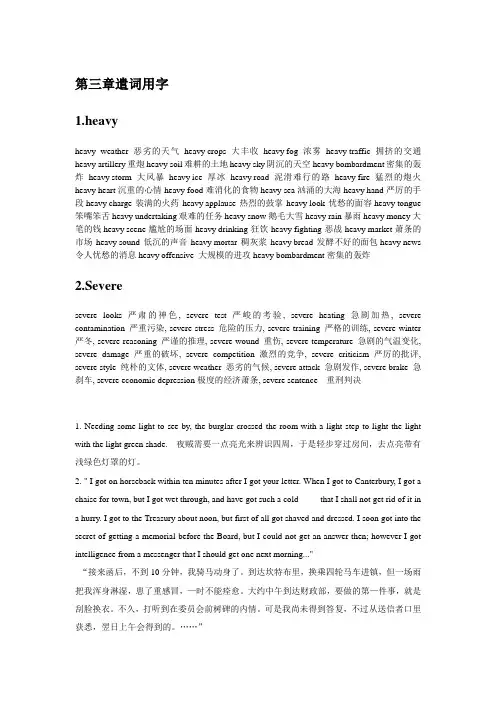
第三章遣词用字1.heavyheavy weather恶劣的天气heavy crops大丰收heavy fog浓雾heavy traffic拥挤的交通heavy artillery重炮heavy soil难耕的土地heavy sky阴沉的天空 heavy bombardment密集的轰炸heavy storm大风暴heavy ice厚冰heavy road泥滑难行的路heavy fire猛烈的炮火heavy heart沉重的心情heavy food难消化的食物heavy sea汹涌的大海heavy hand严厉的手段 heavy charge装满的火药heavy applause热烈的鼓掌heavy look忧愁的面容 heavy tongue 笨嘴笨舌heavy undertaking艰难的任务heavy snow鹅毛大雪heavy rain暴雨heavy money大笔的钱 heavy scene尴尬的场面heavy drinking狂饮heavy fighting恶战heavy market萧条的市场heavy sound低沉的声音heavy mortar稠灰浆heavy bread发酵不好的面包 heavy news 令人忧愁的消息heavy offensive 大规模的进攻heavy bombardment密集的轰炸2.Severesevere looks严肃的神色, severe test 严峻的考验, severe heating 急剧加热, severe contamination 严重污染, severe stress 危险的压力, severe training 严格的训练, severe winter 严冬, severe reasoning 严谨的推理, severe wound 重伤, severe temperature 急剧的气温变化, severe damage 严重的破坏, severe competition 激烈的竞争, severe criticism 严厉的批评, severe style 纯朴的文体, severe weather 恶劣的气候, severe attack 急剧发作, severe brake 急刹车, severe economic depression极度的经济萧条, severe sentence 重刑判决1. Needing some light to see by, the burglar crossed the room with a light step to light the light with the light green shade. 夜贼需要一点亮光来辨识四周,于是轻步穿过房间,去点亮带有浅绿色灯罩的灯。
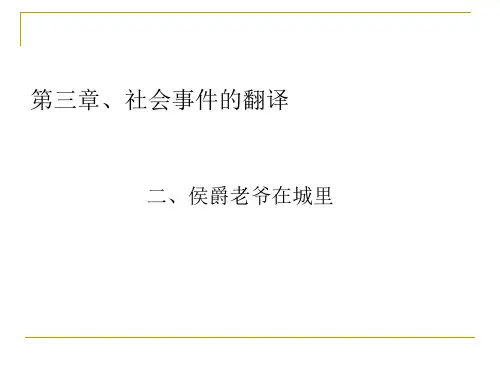
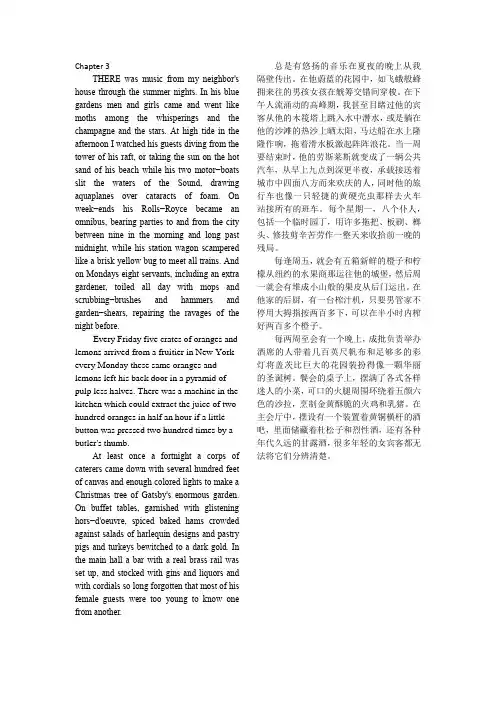
Chapter 3THERE was music from my neighbor's house through the summer nights. In his blue gardens men and girls came and went like moths among the whisperings and the champagne and the stars. At high tide in the afternoon I watched his guests diving from the tower of his raft, or taking the sun on the hot sand of his beach while his two motor−boats slit the waters of the Sound, drawing aquaplanes over cataracts of foam. On week−ends his Rolls−Royce became an omnibus, bearing parties to and from the city between nine in the morning and long past midnight, while his station wagon scampered like a brisk yellow bug to meet all trains. And on Mondays eight servants, including an extra gardener, toiled all day with mops and scrubbing−brushes and hammers and garden−shears, repairing the ravages of the night before.Every Friday five crates of oranges and lemons arrived from a fruitier in New York every Monday these same oranges and lemons left his back door in a pyramid of pulp less halves. There was a machine in the kitchen which could extract the juice of two hundred oranges in half an hour if a little button was pressed two hundred times by a butler's thumb.At least once a fortnight a corps of caterers came down with several hundred feet of canvas and enough colored lights to make a Christmas tree of Gatsby's enormous garden. On buffet tables, garnished with glistening hors−d'oeuvre, spiced baked hams crowded against salads of harlequin designs and pastry pigs and turkeys bewitched to a dark gold. In the main hall a bar with a real brass rail was set up, and stocked with gins and liquors and with cordials so long forgotten that most of his female guests were too young to know one from another.总是有悠扬的音乐在夏夜的晚上从我隔壁传出。
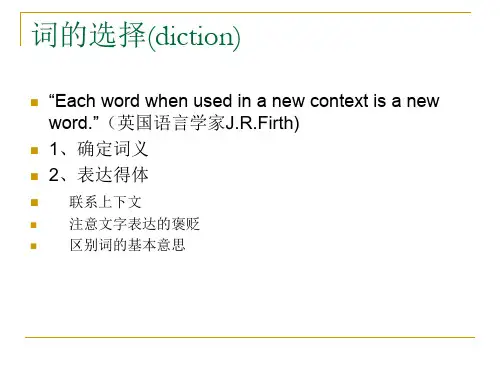
![[VIP专享]了不起的盖茨比第三章中英翻译The Great Gatsby Chapter 3](https://uimg.taocdn.com/43e3407c83c4bb4cf7ecd198.webp)
Chapter 3THERE was music from my neighbor's house through the summer nights. In his blue gardens men and girls came and went like moths among the whisperings and the champagne and the stars. At high tide in the afternoon I watched his guests diving from the tower of his raft, or taking the sun on the hot sand of his beach while his two motor−boats slit the waters of the Sound, drawing aquaplanes over cataracts of foam. On week−ends his Rolls−Royce became an omnibus, bearing parties to and from the city between nine in the morning and long past midnight, while his station wagon scampered like a brisk yellow bug to meet all trains. And on Mondays eight servants, including an extra gardener, toiled all day with mops and scrubbing−brushes and hammers and garden−shears,repairing the ravages of the night before.Every Friday five crates of oranges and lemons arrived from a fruitier in New York every Monday these same oranges and lemons left his back door in a pyramid of pulp less halves. There was a machine in the kitchen which could extract the juice of two hundred oranges in half an hour if a little button was pressed two hundred times by a butler's thumb.At least once a fortnight a corps of caterers came down with several hundred feet of canvas and enough colored lights to make a Christmas tree of Gatsby's enormous garden. On buffet tables, garnished with glistening hors−d'oeuvre,spiced baked hams crowded against salads of harlequin designs and pastry pigs and turkeys bewitched to a dark gold. In the main hall a bar with a real brass rail was set up, and stocked with gins and liquors and with cordials so long forgotten that most of his female guests were too young to know one from another.总是有悠扬的音乐在夏夜的晚上从我隔壁传出。
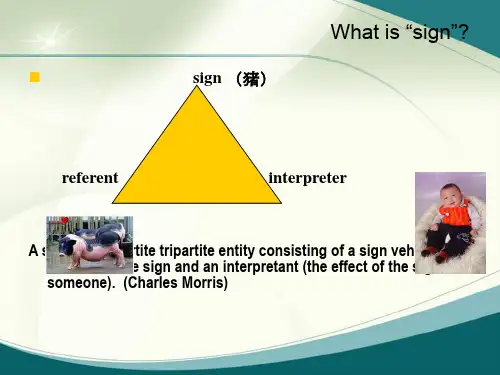
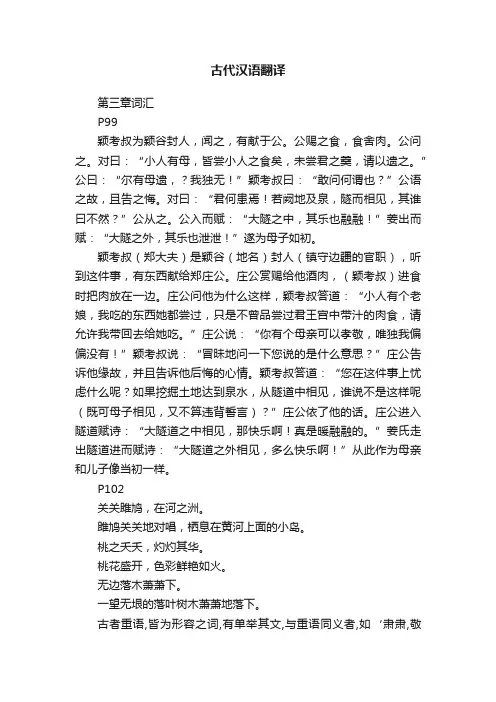
古代汉语翻译第三章词汇P99颖考叔为颖谷封人,闻之,有献于公。
公赐之食,食舍肉。
公问之。
对曰:“小人有母,皆尝小人之食矣,未尝君之羹,请以遗之。
”公曰:“尔有母遗,?我独无!”颖考叔曰:“敢问何谓也?”公语之故,且告之悔。
对曰:“君何患焉!若阙地及泉,隧而相见,其谁曰不然?”公从之。
公入而赋:“大隧之中,其乐也融融!”姜出而赋:“大隧之外,其乐也泄泄!”遂为母子如初。
颖考叔(郑大夫)是颖谷(地名)封人(镇守边疆的官职),听到这件事,有东西献给郑庄公。
庄公赏赐给他酒肉,(颖考叔)进食时把肉放在一边。
庄公问他为什么这样,颖考叔答道:“小人有个老娘,我吃的东西她都尝过,只是不曾品尝过君王宫中带汁的肉食,请允许我带回去给她吃。
”庄公说:“你有个母亲可以孝敬,唯独我偏偏没有!”颖考叔说:“冒昧地问一下您说的是什么意思?”庄公告诉他缘故,并且告诉他后悔的心情。
颖考叔答道:“您在这件事上忧虑什么呢?如果挖掘土地达到泉水,从隧道中相见,谁说不是这样呢(既可母子相见,又不算违背誓言)?”庄公依了他的话。
庄公进入隧道赋诗:“大隧道之中相见,那快乐啊!真是暖融融的。
”姜氏走出隧道进而赋诗:“大隧道之外相见,多么快乐啊!”从此作为母亲和儿子像当初一样。
P102关关雎鸠,在河之洲。
雎鸠关关地对唱,栖息在黄河上面的小岛。
桃之夭夭,灼灼其华。
桃花盛开,色彩鲜艳如火。
无边落木萧萧下。
一望无垠的落叶树木萧萧地落下。
古者重语,皆为形容之词,有单举其文,与重语同义者,如‘肃肃,敬也’,‘丕丕,大也’,只言“肃”、只言‘丕’,亦为“敬也”、“大也”;有单举其文即与重语异义者,如‘坎坎,喜也’,‘居居,恶也’,只言‘坎’,只言‘居’,则非“喜”与“恶”矣。
燕燕于飞,差池其羽。
燕子天上飞翔,参差舒展翅膀。
行行重行行,与君生别离。
走了又走,不停地走,和你活生生地离别。
树树皆秋色,山山惟落晖。
每一棵树都染上秋天的色彩,每一座山都披上落日的余晖。
论语第三章写了什么论语第三章原文及翻译
子曰:“巧言令色,鲜矣仁!”
巧,巧妙地,有技巧的;言,言语;令,美,善;色,脸色;
孔子说:“(与人交谈时)语言巧妙又讲究技巧,脸色尽善尽美,(这样的人)很少有仁爱之人。
”
此章,是孔子对于那些能言善辩者的批评。
孔子认为,过分的讲究语言技巧的人很少有仁义之人。
与人交谈之时,是要讲究一些技巧。
但是,语言技巧是为了服务于谈话内容,是为了达成目的的手段与方法。
若是一味地讲究语言技巧,势必会造成重视手段与方法而超过与内容的情况。
这样一来,口中所言只是为了达到自己的目的罢了,与自己的观点、想法等并没有什么必然联系,甚至可能口中所言与心中所想背道而驰。
如此一来,又何谈仁呢?
心中所思,口中所言,皆为吾意。
如此方可表里如一。
Little Prince[ Chapter 3 ]- the narrator learns more about from where the little prince cameIt took me a long time to learn where he came from. The little prince, who asked me so many questions, never seemed to hear the ones I asked him. It was from words dropped by chance that, little by little, everything was revealed to me.The first time he saw my airplane, for instance (I shall not draw my airplane;that would be much too complicated for me), he asked me: "What is that object?""That is not an object. It flies. It is an airplane. It is my airplane." And I wasproud to have him learn that I could fly.He cried out, then: "What! You dropped down from the sky?""Yes," I answered, modestly."Oh! That is funny!"And the little prince broke into a lovely peal of laughter, which irritated mevery much. I like my misfortunes to be taken seriously.Then he added: "So you, too, come from the sky! Which is your planet?"At that moment I caught a gleam of light in the impenetrable mystery of his presence; and I demanded, abruptly: "Do you come from another planet?"But he did not reply. He tossed his head gently, without taking his eyes frommy plane: "It is true that on that y ou can‘t have come from very far away..."小王子【第三章】-叙述者知道了更多关于小王子是从哪里来的的事搞清楚他从哪里来用了我很长时间。
《道德经》第三章原文、翻译(译文)注释及延伸阅读[原文]不上贤①,使民不争;不贵难得之货②,使民不为盗③;不见可欲④,使民不乱。
是以圣人之治也,虚其心⑤,实其腹,弱其志⑥,强其骨,恒使民无知、无欲也。
使夫知不敢⑦、弗为而已⑧,则无不治矣⑨。
[译文]不推崇有才德的人,导使老百姓不互相争夺;不珍爱难得的财物,导使老百姓不去偷窃;不显耀足以引起贪心的事物,导使民心不被迷乱。
因此,圣人的治理原则是:排空百姓的心机,填饱百姓的肚腹,减弱百姓的竞争意图,增强百姓的筋骨体魄,经常使老百姓没有智巧,没有欲望。
致使那些有才智的人也不敢妄为造事。
圣人按照“无为”的原则去做,办事顺应自然,那么,天才就不会不太平了。
[注释]①上贤:上,同“尚”,即崇尚,尊崇。
贤:有德行、有才能的人。
②贵:重视,珍贵。
货:财物。
③盗:窃取财物。
④见(xian):通“现”,出现,显露。
此是显示,炫耀的意思。
⑤虚其心:虚,空虚。
心:古人以为心主思维,此指思想,头脑。
虚其心,使他们心里空虚,无思无欲。
⑥弱其志:使他们减弱志气。
削弱他们竞争的意图。
⑦敢:进取。
⑧弗为:同“无为”。
⑨治:治理,此意是治理得天下太平。
[延伸阅读1]王弼《道德经注》不尚贤,使民不争;不贵难得之货,使民不为盗;不见可欲,使心不乱。
贤,犹能也。
尚者,嘉之名也。
贵者,隆之称也。
唯能是任,尚也曷为?唯用是施,贵之何为?尚贤显名,荣过其任,为而常校能相射。
贵货过用,贪者竞趣,穿窬探箧,没命而盗。
故可欲不见,则心无所乱也。
是以圣人之治,虚其心,实其腹,心怀智而腹怀食,虚有智而实无知也。
弱其志,强其骨。
骨无知以干,志生事以乱。
常使民无知无欲,守其真也。
使夫知者不敢为也。
知者谓知为也。
为无为则无不治。
[延伸阅读2]苏辙《老子解》不尚賢,使民不爭;不貴難得之貨,使民不為盜;不見可欲,使心不亂。
是以聖人之治也,虛其心,實其腹,弱其志,強其骨。
尚賢,則民恥於不若而至於爭。
貴難得之貨,則民病於無有而至於盜。
论语十二章原文及翻译_论语第三章原文和翻译【--经典手机短信】《论语》是儒家学派的经典著作之一,那么,以下是给大家整理收集的论语第三章原文和翻译,供大家阅读参考。
论语第三章原文和翻译:1、孔子谓季氏:“八佾舞于庭,是可忍也,孰不可忍也?”译文:孔子谈到季氏时说:“用天子的礼乐(八佾舞)在他家的庭院中祭祀祖先(越礼),对于季氏这样的事情都可以容忍,还哪些事情不可以容忍呢?”2、三家者以雍彻。
子曰:“‘相维辟公,天子穆穆’,奚取于三家之堂?”译文:孟孙、叔孙、季孙三家卿大夫,祭祀祖先时,按照天子的礼制唱着《雍》来撤除祭品。
孔子说:“《诗经》上说,‘天子祭祀宗庙,天下各路诸侯都来助祭,天子庄重肃穆地主祭。
’这两句话用在三家祭祀的庙堂之上,天下哪一个诸侯会来陪祭呢?”3、子曰:“人而不仁,如礼何?人而不仁,如乐何?”译文:孔子说:“一个人没有真诚的心意,能用礼做什么呢?一个人没有真诚的心意,能用乐做什么呢?”4、林放问礼之本。
子曰:“大哉问!礼,与其奢也,宁俭;丧,与其易也,宁戚。
”译文:林放向孔子请教礼的根本道理。
孔子说:“你提的真是大问题啊!一般的礼与其辅张奢侈,宁可简约朴素;至于丧礼,与其仪式周全,不如心中哀戚。
”5、子曰:“夷狄之有君,不如诸夏之亡也。
”译文:孔子说:“夷狄(中原之外的少数民族)都有自己的君主,不像诸夏(中原各国)这些国家没有君主(因为时代很乱,弑父弑君的事情时常发生)。
”不如:不像。
6、季氏旅于泰山。
子谓冉有曰:“女弗能救与?”对曰:“不能。
”子曰:“呜呼!曾谓泰山不如林放乎?”译文:季氏要去祭祀泰山(违背了礼)。
孔子对冉有说:“你不能劝阻他吗?”冉有说:“不能(当时冉有为季氏家臣)。
”孔子说:“唉!难道说泰山之神还不如林放懂礼吗?(或:难道说泰山之神能够接受季氏这种不合礼的祭祀吗?)”7、子曰:“君子无所争。
必也射乎!揖让而升,下而饮。
其争也君子。
”译文:孔子说:“君子没有什么可争的。